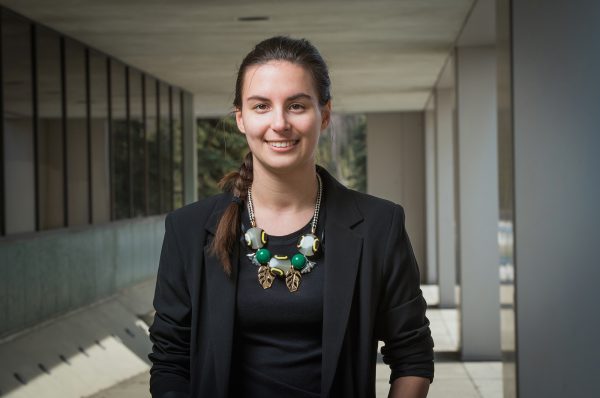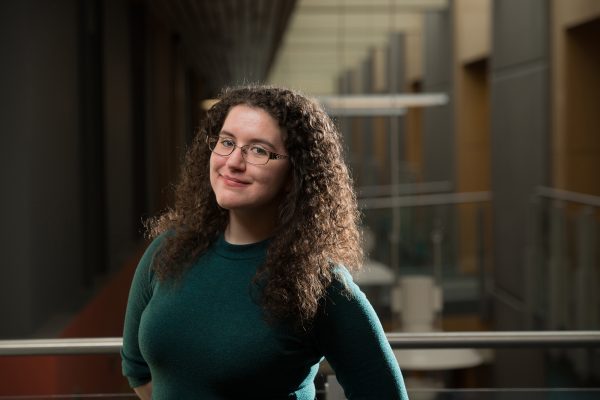Two UAA language grads head off to the land of Fulbrights, bringing UAA’s total to 14
by Jess |
UAA has two successful Fulbright applicants this year: Ioana Lobontiu and Megan Green. Both young women are West High graduates. Both earned double majors at UAA. Both were mentored by Dr. Natasa Masanovic in the languages department.

UAA Fulbright Scholarship Recipient Ioana Lobontiu, photographed in front of the Administration and Humanities Building, where she has attended many classes as a language and international studies major. (Photo by James Evans / University of Alaska Anchorage)
Their Fulbright timeline goes something like this: apply in September of their senior year, learn of their success in late March, and leave in August to teach English in Germany, with an option to extend one more year. Exactly where in Germany, they don't know yet.
Ioana has an additional choice to make. She learned last week that she has also qualified for Fulbright Austria, an opportunity to teach English in two high schools in Vienna. She's weighing her options.
Ioana and Megan grow the total number of successful Department of Languages Fulbrights to 14 over time (two to Spain, one to Ecuador and 11 to Germany).
The Fulbright is a signature achievement. The program offers research, study and teaching opportunities in more than 140 countries to recent graduates and graduate students. Original funding comes from a post-WWII U.S. Congressional bill to apply surplus war property to fund "the promotion of international good will through the exchange of students in the fields of education, culture and science." Senator J. William Fulbright authored the bill and President Harry Truman signed it into law in 1946. Today, Congress passes an annual appropriation to keep the program going. Every year about 3,600 candidates make the grade, and join an alumni army of 360,000.
Here at home at UAA, the good news is still sinking in. I sat down with Megan and Ioana for two reasons: to celebrate their success, and to learn just how they did it. What is the application process like? What kind of students are they? Do they study all the time, or balance outside interests and responsibilities? On the brink of their departure from UAA, what advice do they have for those in the ranks behind them?
So, from the wisdom of the winners, here is how these two Fulbrights happened.
Find your guideposts

Fulbright Scholarship Recipient Megan Green, photographed in the UAA/APU Consortium Library. (Photo by James Evans / University of Alaska Anchorage)
Megan will graduate with a double major in economics and German and a minor in math. She's been studying German since middle school, and had the same favorite high school teacher for four years. He clued her in to Natasa Masanovic at UAA, so she was fully aware it was a quality program.
Similarly, her father teaches economics at West High and introduced her early on to Dr. Kyle Hampton, who until last year taught economics at UAA.
"In both disciplines I was interested in, there was someone in that department who could be my touchstone," she said. Both faculty members influenced her college career.
She has advice. "I had good luck with counselors. One note on that: I always go to the same counselor." And one more tip, this from a woman who says she has "100 tips for undergrads, and 70 of them would be about DegreeWorks": Make this credit auditing program your new best friend. Megan said she was addicted to it "because it lets you strategize on what to take when."
She especially loved the 'what if' feature that lets you imagine changing majors and visualizing the requirements of a new path. And don't be intimidated by it. "I am pretty sure technology is allergic to me," she says, laughing easily, "and even I can use this tool!"
Romania-born Ioana followed her professor father from Romania to Tennessee to New York, back to Romania, and finally to UAA, where he teaches mechanical engineering. Her twin sister chose to leave Alaska for Wellesley College. But Ioana, like Megan, saw a lot at UAA that appealed to her. In December she completed a double major in languages (German and French; she also speaks Spanish and Romanian) and international studies.
Unlike Megan, who'd never heard of the Fulbright, Ioana decided at 17 that she would work to win it. As a high school junior, she met Professor Masanovic at a world languages declamation contest. When Masanovic complimented her German and asked her to think about UAA's program, Ioana replied, "Yes, that is my plan!"
Of Professor Masanovic, she says: "This is a professor who clearly works very closely with her students, develops a mentor-student relationship with everyone, to a high degree. And all the students feel supported. Why shouldn't I go to this program? Although it is small, I will get the attention I need."
One of her biggest takeaways from working with Masanovic, says Ioana, was leadership skills, especially when Ioana took on the presidency of the German Club. "She is so calm and collected. If I was having a freak-out moment...she'd say, 'Just take a breath. You will have time...it is not the end of the world.'"
Take risks
The hardest thing for Ioana, a quiet-spoken and thoughtful person, was getting to know people on campus. "I forced myself to go to the German Club," she said. "I didn't say much at first. There were native speakers there, it was intimidating. But just by repeating that and getting to know this group of people, it really helped me break into campus life."
She also "randomly" took an ethics class, and ended up in the ethics bowl, winning regionally and going on to compete in Seattle. "It was a wonderful experience," she says now.
Megan, who says she struggles the most with math, refused to give it up in college. "It seems like I have had math every day of my life, so going to school without math - just didn't feel like school to me," she said.
Despite the difficulty, she took pleasure in the subject. "I love seeing how you can draw a picture of reality with numbers. That is so cool! But that doesn't mean I am good at it," she said. "If I hadn't gone for that math minor, I'd have a 4.0."
Still, no regrets. She says the math professors were very encouraging, and "there is a danger in college that you stop taking the kinds of classes that really challenge you. ODE (ordinary differential equations) challenged me!"
Both students took tough classes while they balanced jobs tutoring German on and off campus. And no, they didn't just study all the time. Megan worked off steam at her favorite pastime, social dancing, like salsa and swing. Ioana is a good volleyball player who loves the game and the exercise.
Write 'til it hurts
Both Megan and Ioana say writing their Fulbright essays - limited to one page and aimed at persuading a selection committee - was incredibly difficult. It happened over many months, and took draft after draft after draft.
Megan says college students aren't taught to write the way Masanovic coached them in the essays.
Instead, "you get an essay assignment, and it has a word count minimum. That incentivizes people to pad their essays, to use unnecessary flowery language, or the classic - pull words out of thesaurus.com, words they don't really know how to use. So writing assignments are five pages when they should be three," she said.
Masanovic doesn't tell candidates what to write, Megan and Ioana said. She reads and reads and reads, then offers feedback.
In the beginning, Megan said, Masanovic pointed out unformed or unclear ideas, or "when something was vague or nebulous." But then, the going got tougher: "This phrase is too long or rambling...this whole half a paragraph is neat, but it's not contributing enough for the space it is taking up...take this paragraph and turn it into two sentences."
Ioana described a similar experience. "I would go into Dr. Masanovic's office and we'd read through it together and she'd be like, 'Oh...well, you know... this does makes sense, but I feel you are not being the complete person that you are. You forgot to mention this and you should rephrase that,'...it was very difficult to get all of my life to fit on one page and not have it sound strange."
Obviously, the work paid off. But even if she hadn't won the Fulbright, Megan said the writing experience alone would have been worth every struggle.
The wonderful moment
When people have worked this hard for something, they usually remember exactly where they were when they got good news.
Late on a Friday night in March, Megan was playing Monopoly at a friend's house. Randomly, she checked her phone. There it was: Fulbright Scholarship. Her email shows the first line, which included the word Congratulations.
"I'm like, ohmygod. I just pushed the phone to my friend. For the next five minutes...squeak, squeak, squeak...I was almost nonverbal." She said her dad was very happy when she came home at 1 a.m. to say, "Dad, I got the Fulbright!"
Ioana was driving home from work mid-day. She'd just checked her phone at work, but checked it again in the driveway. She saw Robert J. Fulbright.
"Ahhhh, I screamed for a full minute! Then I read it. It was positive. I went inside and said, "MOM, GUESS WHAT HAPPENED?"
Perhaps the least surprised is Natasa Masanovic, who spent years nurturing these two young scholars. I asked her what made them winning candidates.
"Ioana does everything with care, elegance, humility, and kindness," Masanovic wrote back. "She is focused, resourceful, and, above all, always ready to take risks. This, combined with her intelligence, hard work, motivation, and trustworthiness, has allowed her to excel in so many areas. She has accomplished remarkable things."
And Megan?
"Megan is genuinely interested in people," she wrote. "She is kind, warm-hearted, and very independent. She is inspirational. She likes to learn from others and, in return, generously shares what she has, what she knows. Through this quality, she constantly learns about different areas, and connects herself to the new, to the unknown - a perfect quality that she will use on a daily basis while teaching in Germany next year."
Let the grand adventures begin!
Written by Kathleen McCoy for UAA
CORRECTION - Feb. 25, 2019: An earlier version of this story misstated the number of Fulbright Students produced by UAA. As of the 2018-19 program year, fourteen (not 15) UAA students have received Fulbright scholarships.
 "Two UAA language grads head off to the land of Fulbrights, bringing UAA’s total to
14" is licensed under a Creative Commons Attribution-NonCommercial 4.0 International License.
"Two UAA language grads head off to the land of Fulbrights, bringing UAA’s total to
14" is licensed under a Creative Commons Attribution-NonCommercial 4.0 International License.









